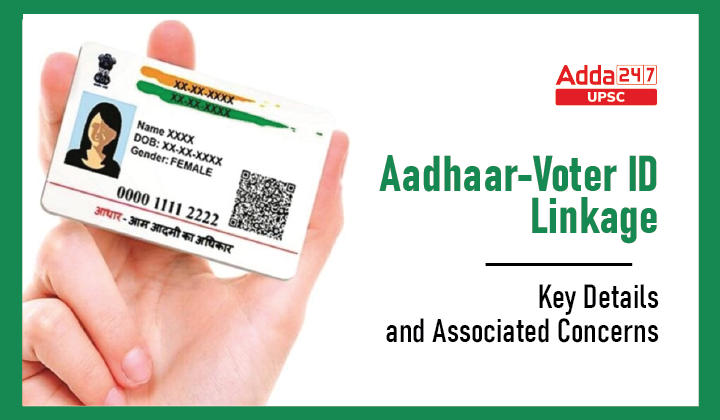Table of Contents
Aadhaar-Voter ID Linkage- Relevance for UPSC Exam
- GS Paper 2: Governance, Administration and Challenges
- Government policies and interventions for development in various sectors and issues arising out of their design and implementation.
Aadhaar-Voter ID Linkage in News
- Recently, the Election Commission of India (ECI) launched a campaign to promote the linkage of Voter ID and Aadhaar.
- In this context, many reports have surfaced online of instances where block level officers have asked individuals to link their Aadhaar with their Voter IDs, failing which their Voter IDs could be cancelled.
Aadhaar-Voter ID Linkage- Government’s Rationale
- Weeding out Duplicate Voters: The EC conducts regular exercises to maintain an updated and accurate record of the voter base.
- A part of this exercise is to weed out duplication of voters, such as migrant workers who may have been registered more than once on the electoral rolls in different constituencies or for persons registered multiple times within the same constituency.
- As per the government, linkage of Aadhaar with voter IDs will assist in ensuring that only one Voter ID is issued per citizen of India.
- Wide Coverage of Aadhar: At the end of 2021, 99.7% of the adult Indian population had an Aadhaar card.
- This coverage exceeds that of any other officially valid document such as driver’s licence, ration cards, PAN cards etc that are mostly applied for specific purposes.
- Reliable and Cost Efficient: Since Aadhaar allows for biometric authentication, Aadhaar based authentication and verification is considered more reliable, quicker and cost efficient when compared to other IDs.
Is the linking of Aadhaar with one’s Voter ID mandatory?
- Legal Amendment: Parliament passed the Election Laws (Amendment) Act, 2021 to amend the Representation of the People Act, 1950, inter alia.
- Section 23(4) was inserted in the Representation of the People Act, 1950.
- It states that the electoral registration officer may “for the purpose of establishing the identity of any person” or “for the purposes of authentication of entries in electoral roll of more than one constituency or more than once in the same constituency” for citizens already enrolled, require them to furnish their Aadhaar numbers.
- Government Notification: in June 2022, the government notified changes to the Registration of Electors Rules, 1960.
- Rule 26B was added to provide that “every person whose name is listed in the roll may intimate his Aadhar number to the registration officer”.
- Aadhaar-Voter ID Linkage Optional in Nature: Though both the government and the EC assured that linkage of the Aadhaar with Voter ID is optional, this does not seem to be reflected in Form 6B issued under the new Rule 26B.
Associated Concerns with Aadhaar-Voter ID Linkage
- Vague Provisions: Form 6B provides the format in which Aadhaar information may be submitted to the electoral registration officer.
- Form 6B provides the voter to either submit their Aadhaar number or any other listed document.
- However, the option to submit other listed documents is exercisable only if the voter is “not able to furnish their Aadhaar number because they do not have an Aadhaar number”.
- To that extent, the element of choice that has been incorporated in the amendments seem to be negated or at the very least thrown into confusion.
- Contradicts Puttaswamy Judgment: It needs to be considered whether such mandatory linkage of Aadhaar with Voter ID would pass the test of being “necessary and proportionate” to the purpose of de-duplication which is sought to be achieved.
- Lal Babu Hussein (1995) Case: the Supreme Court had held that the Right to vote cannot be disallowed by insisting only on four proofs of identity — voters can rely on any other proof of identity and obtain the right to vote.
Aadhaar-Voter ID Linkage- Conclusion
- It is important that the government clarifies through correction in Form 6B that the linking is not mandatory and expedites the enactment of a data protection legislation that allays concerns of unauthorised processing of personal data held by the government.




 TSPSC Group 1 Question Paper 2024, Downl...
TSPSC Group 1 Question Paper 2024, Downl...
 TSPSC Group 1 Answer key 2024 Out, Downl...
TSPSC Group 1 Answer key 2024 Out, Downl...
 UPSC Prelims 2024 Question Paper, Downlo...
UPSC Prelims 2024 Question Paper, Downlo...




